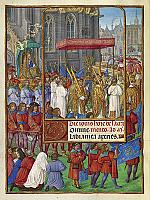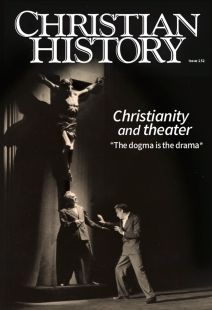Editor's note: Christianity and theater

In my house lives an aspiring actor.
I always knew she had a flair for the dramatic, but when she participated in her very first performance, Finding Nemo Jr. (and persevered through what we later found out was pink eye at the second show), I knew that she had not only a real gift, but also a real love for the stage.
If you’re a parent, you know how satisfying it is when your kid finds their “thing.” But if you’re also a Christian, you might wonder how that “thing” will affect your child’s faith. When I first started Googling theater programs in my area, I had to wonder: what does a Christian relationship with theater look like?
HOW SHOULD WE THEN LIVE?
My relationship with the theater has been ambivalent. On one hand, as a Christian creative myself, I have seen the value of God-honoring performance done well—one example is when Piercing Word, a theatrical group that does live Scripture performances, came to our small mission church for Advent. The impact of carefully selected Old and New Testament passages coupled with the emotional force of those words spoken and performed brought me to tears. And I can recount numerous productions, overtly Christian and not, that turned my eyes upward.
On the other hand, I’ve had my fair share of concerns in the participation of other forms of theater, from half-baked “Christian” productions to productions with messages that are in tension with or outright antagonistic to Christianity. (As a former youth group leader, I attended many musicals that my teens participated in—and in some, I left wondering at the wisdom of allowing young people to perform adult dramas in front of their peers and parents.)
The question of how we should live when it comes to the performing arts is actually a pressing one in our daily lives. We live in a culture that revolves around the entertainment industry. Film, video games, live performances, and other spectacles fill much of our time and take much of our energy. How we interact with entertainment can say a lot about the place of faith in our lives. So how should we?
NO NEW CRITIQUE UNDER THE SUN
Our conundrum, of course, is not unique to our time. For 2,000 years, Christians have approached the theater in numerous ways. Some, like Tertullian, Augustine, and many in the early church, rejected it, identifying the anti-Christian and idolatrous roots of the theater of their time that made participation a problem. These critiques persisted throughout the Reformation and later, as thinkers from Puritans to nineteenth-century theologians echoed their predecessors and pinpointed many of the same sin issues the early church faced.
But others embraced it, redeemed it, and created it. Even in the ancient church, where many critiques originated, drama came through liturgy and spoke of a participation in the holy through performance. Medieval religious dramas, performed during festivals involving the entire community, often drew from biblical stories. Exploration of Christian themes in society found in the works of playwrights such as William Shakespeare and Christopher Marlowe display that Christ permeated even the secular sphere of theater.
This incarnational aspect persisted into the next generations, as in this issue’s stories about the lives of George and Louisa MacDonald and her adaptation of Pilgrim’s Progress, the revivalist oratory of the Great Awakenings, and the sacred subversions of godless modernity in the works of some of the Inklings and their contemporaries. You’ll also read about how theater has brought audiences to the feet of Christ across cultures and societies, such as in Chicano and African American theater.
As believers of the twenty-first century continue to use drama to share the gospel in creative and powerful ways, it’s helpful to explore the depth and complexity of Christian’s historical involvement in theater. Though the voices represented offer different answers, the outworking of their caution or creativity was ultimately the same—pointing to the true Spectacle, the greatest Story ever told, in the life, death, and Resurrection of Jesus Christ.
And with that in mind, perhaps the best I can do for my fledgling performer is to encourage her to that end. CH
Kaylena Radcliff,
Managing Editor
We thank Joe Ricke and Sarah R. A. Waters for their counsel and contributions to this issue.
By Kaylena Radcliff
[Christian History originally published this article in Christian History Issue #152 in 2024]
Kaylena Radcliff is managing editor of Christian HistoryNext articles
The spectacle and the spiritual
How the early church interacted with Roman and Greek theater
David L. Eastman“Not consistent with true religion”
Tertullian penned one of Christianity’s oldest and most famous critiques of theatrical pursuits.
TertullianReforming drama
During religious change, English playwrights faced shifting attitudes about theater
Sarah R. A. WatersSupport us
Christian History Institute (CHI) is a non-profit Pennsylvania corporation founded in 1982. Your donations support the continuation of this ministry
Donate







